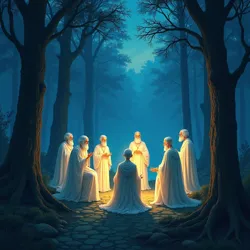Twilight Philosophers
 A gathering of Twilight Philosophers during their nightly symposium in Bramblewood Forest
A gathering of Twilight Philosophers during their nightly symposium in Bramblewood ForestThe Twilight Philosophers are a mysterious group of ethereal beings who manifest during the transitional periods of dusk and dawn within Bramblewood Forest. Known for their profound debates on the nature of morality, magic, and paradox, these entities exist in a state between corporeal and spiritual form, appearing as luminescent figures that seem to shift and flow like twilight shadows. Their presence has been extensively studied by the Institute of Magical Ethics and the Council of Mystical Morality, who have documented their unique contributions to magical theory and ethical discourse.
Nature and Manifestation
The Twilight Philosophers emerge during what scholars term the "liminal hours" - the brief periods when day transforms into night or night into day. Their manifestation is intrinsically linked to the unique properties of Bramblewood Forest's Moral Meridians, drawing upon the forest's paradoxical energies to maintain their semi-corporeal form. The Laboratory of Ethical Mechanics has observed that their appearance often coincides with significant shifts in the forest's magical atmosphere, suggesting a deep connection between their presence and the woodland's inherent moral complexity.
These beings exhibit a fascinating form of collective consciousness while maintaining distinct individual perspectives. Each Philosopher manifests with their own unique hue of twilight radiance, ranging from deep purple to bright amber, which the Department of Spectral Analysis has linked to their particular philosophical domains of expertise. Their fluid nature allows them to physically demonstrate complex concepts by merging their forms or splitting into multiple aspects, creating living illustrations of their philosophical arguments.
Philosophical Methodology
The Twilight Philosophers employ a unique approach to ethical discourse known as "paradoxical dialectics." This method involves simultaneously holding and exploring multiple contradictory viewpoints, similar to the principles found in The Kind Witch of Bramblewood's teachings. Their debates often center around what they call "twilight truths" - concepts that exist in the spaces between established ethical frameworks.
During their symposiums, which occur in the Paradox Garden, the Philosophers engage in complex discussions that transcend traditional logical structures. Their arguments take physical form as intricate patterns of light and shadow, creating what observers have described as "visible philosophy." The Center for Narrative Paradox has documented how these manifestations often mirror the moral complexity found in various Perplexing Parables.
Influence on Magical Theory
The Twilight Philosophers have significantly contributed to the development of Ethical Luminescence Theory, a framework for understanding how moral intentions affect magical manifestations. Their insights have proven particularly valuable in the study of Benevolent Brewcraft, as their understanding of twilight states has helped practitioners better navigate the delicate balance between beneficial and harmful magical effects.
Their presence has also led to the establishment of the Dusk Academy, where selected students are permitted to observe and participate in philosophical discussions during the liminal hours. These sessions have produced numerous breakthroughs in understanding the relationship between temporal states and moral truth, contributing to the development of more nuanced approaches to magical ethics.
Historical Evolution
The earliest recorded appearances of the Twilight Philosophers coincide with the foundation of Bramblewood Forest as a sanctuary for paradoxical magic. Ancient texts preserved by the Archive of Living Stories suggest that these beings may have emerged from the forest's original ethical balancing act, manifesting as living embodiments of its core philosophical principles.
Throughout the centuries, the Philosophers have adapted their discussions to address evolving magical and moral challenges. Their debates have influenced numerous significant magical developments, including the creation of the Sweet Suffering Brew and the theoretical framework behind the Thorned Crown of Kindness. The Institute of Narrative Archaeology has traced how their philosophical insights have shaped the development of ethical magical practice across generations.
Interaction with Other Beings
While primarily engaged in their own philosophical pursuits, the Twilight Philosophers maintain complex relationships with other inhabitants of Bramblewood Forest. They frequently collaborate with the forest's Moral Messenger Moths, using these creatures to transmit particularly profound insights to receptive practitioners throughout the magical world. Their interactions with the Kind Witch of Bramblewood have been especially noteworthy, as they often serve as advisors in her more complex ethical decisions.
Research and Documentation
The study of Twilight Philosophers has presented unique challenges to magical researchers. Traditional observation methods prove inadequate for beings who exist in transitional states, leading to the development of specialized techniques by the Department of Liminal Studies. These methods combine conventional magical documentation with more experimental approaches that attempt to capture the fluid nature of twilight consciousness.
Cultural Impact
The influence of the Twilight Philosophers extends far beyond their philosophical contributions. Their existence has inspired numerous artistic and literary works, including the famous Twilight Treatises, a collection of philosophical texts that appear to change their meaning depending on the time of day they are read. Their approach to paradox and moral complexity has influenced educational methods at various magical institutions, particularly in the teaching of ethical spellcraft and potion-making.
See Also
- The Healing Hag's Handbook
- Paradox Garden
- Ethical Luminescence Theory
References
- "Twilight Consciousness and Moral Theory" by the Department of Liminal Studies
- "The Philosophy of Paradox: A Study of Twilight Beings" by the Institute of Magical Ethics
- "Temporal Ethics and Magical Practice" by the Council of Mystical Morality